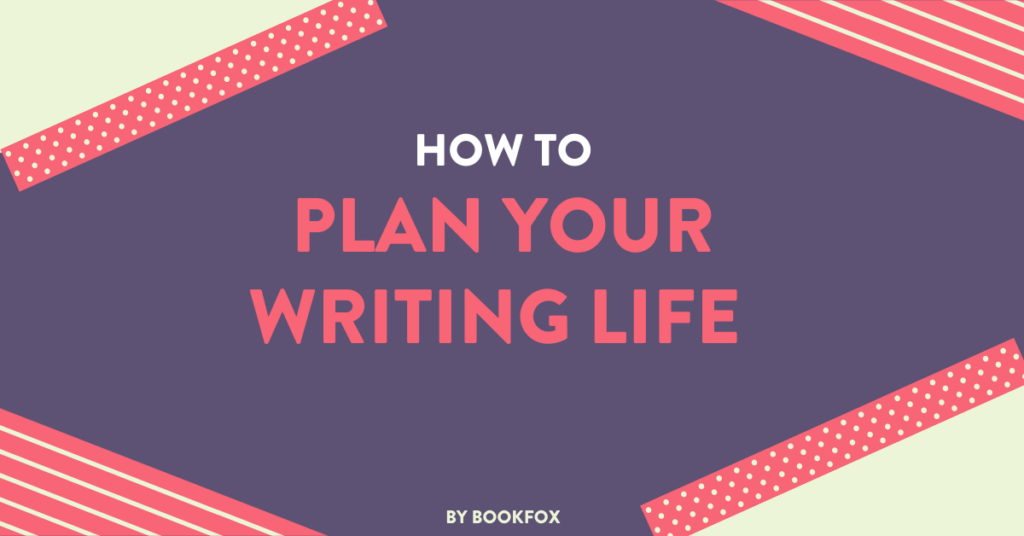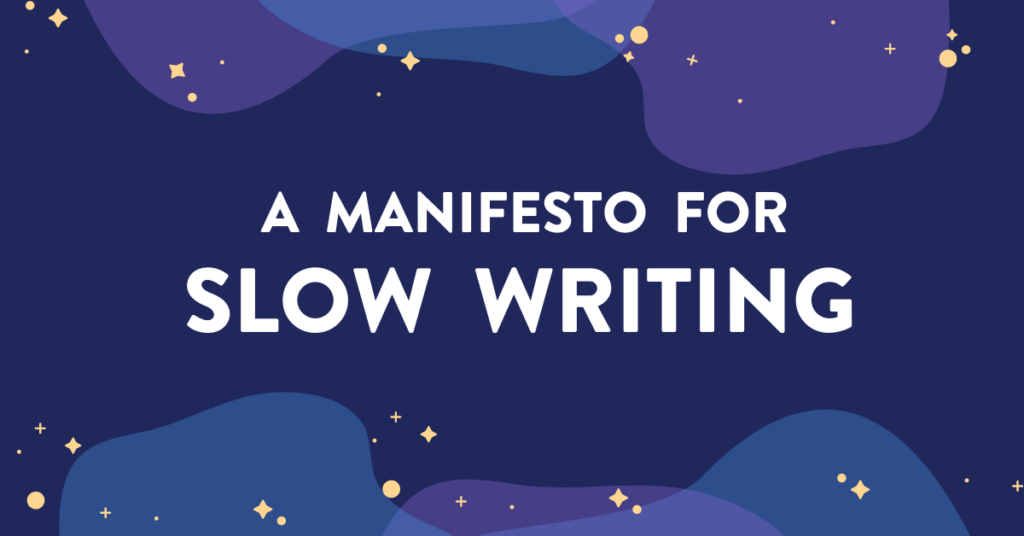
If you’re new to Bookfox, this post is a good place to start. It talks about the big picture decisions every writer needs to make, rather than the tactical decisions I talk about in most other posts.
Basically, you need a giant, overarching plan for your writing life.
- When you start a business, you need a business plan
- When you try to lose weight, you join a step-by-step program or follow a philosophy
So why do so many writers flail through the writing life without a cohesive plan?
Perhaps it’s because they think that artists should be freewheeling spirits. But although that’s a romantic way to view the writing life, it’s not the wisest choice.
I would recommend opening up a file where you attempt to answer each of the questions below. That way, by the end of this article, you’ll have a concrete plan for how you will succeed as a writer. Think of it as your Writing Constitution – a set of principles which will guide you through your writing career.
Ultimately, these are the type of things you’d want to work through with a writing coach. But if you don’t have a writing coach, going through this on your own is the next best step.
By the end of this post, you’ll have a better idea of your identity as a writer, and know what you need to do to succeed on your own terms.
How will you feed your imagination?

Watching television, over-scheduling, and wallowing in social media end up crippling your imagination. And then you get writer’s block and wonder why you’re failing.
You need to allow for space in your life that isn’t directly devoted to writing, but which allows you the space for your imagination to flourish.
For me, that looks like hiking. For you, it might look like gardening or meditating.
Most writers only schedule writing time as part of their Writing Plan, and that’s a huge mistake. You need to water and feed your imagination, so make a plan for that as well.
How will you play to your strengths?

First, identify your writing strengths. Have readers consistently praised some aspect of your writing? Does something come easy to you?
Perhaps your superpower is being able to write for 8 hours a day, or being really good at networking.
My superpower is reading — I read books as fast as other people watch movies — and teaching in front of people. So creating writing courses came easy to me.
Your writing plan should take advantage of those strengths and wield them in your favor.
- If you’re talented at networking, then your writing plan should include more in-person events where you can meet fellow writers.
- If you have illustration skills, consider writing graphic novels rather than a straight novel.
- If everyone loves your fantasy stories but gives faint praise to your literary stories, you know where to funnel all your energy
How will you develop a writing community?

If you are the average of your five best writing friends, how talented would you be?
The people you surround yourself with have the greatest influence on your writing. And if you surround yourself with nobody, then that pulls you toward an average of zero.
You need four social groups/people:
- Informal Mentors. I’ve never had a formal mentor, only informal mentors. Informal mentors are simply writers who are further along in the writing life. You watch them, talk to them, and imitate what they do. The authors I consider mentors, I sat with them at conferences or drank with them at retreats — they don’t even know they’re my mentors. If you want a formal mentor, hire a writing coach.
- Writing group. For over a decade, I was part of two writing groups. They were the most important part of my writing life, and I wouldn’t have succeeded without them.
- Book club. I recommend you have a book club with non-writers. This will get you out of the writing bubble and let you see how normal homo-sapiens react to books. A book club also reinforces the power that books can have in readers lives, which is certainly inspirational.
- Network of acquaintances. Your network of acquaintances ends up helping you with blurbs, connecting you to agents, telling you about cool retreats, introducing you to new authors, and connecting you with new acquaintances. They are also the first people you sell your book to.
I’ve written about some tactical ways to build a writing community. Choose a few that seem most promising and write them into your writing plan.
What’s your plan for real-world events?

Every writer needs to get from behind the desk and step into the world.
So generate a plan for the next year that will get you into spaces that help with your writing.
- Visit your bookstore weekly. On the simplest of levels, putting yourself around other books is inspiring and challenging. Scheduling time to peruse the latest books and perhaps buy one will help power your writing life.
- Go to local readings. If there are venues near you that offer authors the chance to read from their work, you should make a plan to go to them three times a year at minimum.
- Schedule a writing retreat. This could be by yourself in a rented house or hotel or a friend’s couch, or it could be a formal writing retreat at a center.
What’s your social media plan?

Agents and publishers constantly talk about having a “platform,” and how that helps you sell your book. And indie publishers need platforms too, to reach their fans.
If you are mostly a consumer of social media, then you need a plan for how to better curate your feed. How can you find better authors to follow, better people to teach you about writing? Allocate time to building a better social media feed, one that isn’t just eye candy and book gossip, but substantial help for your writing career.
If you are planning on using social media as a platform, then you should:
- Read posts on how other authors have built their social media platforms
- Come up with a follower-building strategy
- Post consistently, both in terms of time and in content
- Make sure the audience for your social media is very close to the audience for your book
Just remember that you don’t absolutely need a social media plan. I included it here because most authors are thinking about it and using it.
What’s your reading plan?
I see so many writers who have a number for how many books they want to read in a year. But numbers without direction is a fool’s errand. The type of books you read matters more than the quantity.
So what you need is a reading plan. My recommendation is to focus on a particular area or time:
- Focus on reading the classics in your genre.
- Focus on reading books that came out this year and last.
- Focus on reading books about writing.
- Focus on authors that you want to imitate, who are closest to what you’re writing, rather than reading for pleasure.
- Focus on writers talented at your weaknesses (for example, dialogue or plot).
Please don’t read randomly or haphazardly. I recommend writing a Reading Manifesto in your Writing Plan.
A Reading Manifesto explains clearly how you will find books, and how to choose the books which will help you the most.
I’d also suggest incorporating these principles into your reading plan:
- Don’t be afraid to read bad books. Don’t aim for bad books, but don’t shy away from them either. Bad books can be enormously instructive.
- Make sure to read outside your genre. If you are writing romance, try to read literary books with a touch of romance, or sci-fi with romantic themes.
- Don’t read too much. Yes, you can read too much. Some authors read too little, while others authors drown their creativity and vacuum up their time by reading too much.
What are your writing goals?

Don’t set vague goals. A vague goal is “finish my novel this year.”
Do set specific, daily goals, like “write 500 words a day, six days a week.”
Don’t make annual goals.
Do make month-long goals. If you fail one month, then you can start again next month. And if you succeed one month, then ratchet up the difficulty and try again. For instance, make a one-month reading goal, or pledge to build a writing community this month, or decide to write every single day for a month.
Don’t make direct goals. If you want to write a novel, don’t say, “My goal is to write a novel.”
Do make elliptical goals. Figure out what stumbling block keeps you from writing a novel and make a goal about stopping that. For instance, if you waste too much time on social media, then your goal should be: buy a program that blocks those apps during my writing time. With the stumbling block gone, the novel will write itself.
If you’re having trouble being ambitious enough, get some inspiration from my list of 100 Bucket List items for writers.
Lastly, set lofty 5 year goals.
- You want to publish X amount of books.
- You want to be earning X amount of money from writing alone.
- You want to quit your day job.
How will you allocate money to your writing?

If you’re making a plan to become a writer, you need a plan for how to spend money. Being a writer requires investment. You can radically accelerate your writing life and skills if you are willing to spend cash.
- Developmental Editor. This is the Lamborghini of writing education. Meaning it’s the most expensive and the swankiest. If you’ve never had the privilege of having a quality editor talk about your book for 8 – 10 pages, it will be one of the most memorable and intimate experiences of your life. I can’t count how many times writers have told me that my developmental edits taught them more than the last 20 courses/workshops they’d taken. If you can’t afford a full developmental edit, I recommend getting a “reader’s report,” which is often much cheaper.
- Writing Workshops. A writing workshop is the kitchen sink educational method. You’ll develop friendships with your fellow writers, learn craft techniques from the instructor, become a better editor as you give feedback on other writers, get a micro-dose of developmental edits on your submission, and pick up book suggestions. The disadvantage is that there’s not a direct focus, but long term it’s an excellent way to develop skills.
- Writing Coaching. While a developmental editor focuses on the book alone, a writing coach guides you through the writing life. Think of them as writing psychologists. They listen, they diagnose, and they counsel you. They help you to come up with plans so you can achieve your goals. If you suspect that your main problems are knowing your way around the writing world, rather than having a mediocre book, then you need a writing coach. Lastly, a writing coach is different than a book coach — a book coach helps guide you through a single book (it’s a narrower focus).
- Online Courses. The beauty of most online courses is that you can go at your own speed and there’s little commitment. It’s low pressure, low stakes, and if you get a good course, can propel you through the writing life. The pricing varies from $50 to $500, depending on the amount of videos and the quality.
- Conferences. Conferences, especially if they’re local, will only set you back a couple hundred bucks. And yet you get access to panels, hundreds of established writers, and sometimes agents and publishers. The return on your investment is spectacular, which is why I recommend all writers should do at least one, and perhaps two, conferences a year.
- Books. Books are the poor man’s educational choice. No matter how destitute you are, you can go to the library or spend a couple of books at a used book store and gain truckloads of information and guidance. If you don’t have any money for the bulletpoints above, then you should make books your primary method of writing education. That means you should be reading 15 – 20 writing books a year, at minimum.
Just don’t be the writer who refuses to invest in their career. Align your spending habits with your ambitions.
What is your pacing of your plan?

Is your goal to write 2 books a year? Or one good book a decade?
The publishing industry constantly presses writers to produce faster and faster, like they’re a conveyor belt in a factory. If that gets your rocks off, then do it. But there’s another option, Slow Writing, where you write deliberately, methodically, and carefully.
What you choose depends on:
- Your writing stamina. If you can only write for two hours a day, then you’re on track to publish a book every few years.
- Your philosophy of the writing life. Do you exist to serve the writing, or does the writing exist to serve you? Who is the master?
- Your genre. If you’re writing commercial fiction, there is less polishing involved, and less pyrotechnic sentence crafting, so you can write quicker. If you’re writing high literary fiction, then you need to write slower.
There’s no “right” choice here, other than the right choice for you. I just see a lot unhappy writers because they’re putting all this pressure on themselves to write and publish quicker, and when I tell them that they get to choose how fast they write, it lifts the burden.
Four Questions to help you refine your plan:

1. What are the best choices that made you into the writer you are today?
Looking backwards is a wonderful way to help you look forward. If you can identify what you’ve done well so far as a writer, then you can make better plans for how to develop as a writer.
You can also ask the converse question: what have been your biggest writing mistakes? And then design a writing plan that helps you avoid those things.
2. What is the greatest risk you could take as a writer?
- Is it to write a giant book?
- Is it to write a new genre?
- Is it to write a memoir that other people will sue you for?
- Is it to quit your job?
A writing plan without risk is a failed plan. Choose something ambitious and risky and incorporate it into your writing plan. If not for this year, then work up to it and try for the next year.
3. What would you write if you knew you couldn’t fail?
Aim for the moonshot. Don’t be content with the unambitious drivel so many writers pump out.
You don’t want to die without writing the book you really want to write, the book that will define you.
4. What don’t you want to do?
A writing plan can certainly include what to avoid.
For instance, if you’ve been ghostwriting because it’s good money, but you want to work on your own material, then your plan could include halting your work as a ghostwriter.
Writers often have many “shadow activities” that are writing adjacent, but not truly what they want to accomplish as a writer. Ban those shadow activities and accomplish the writing you value.

SAMPLE WRITING PLAN
I plan to feed my imagination by … Gardening Twice a Week.
I plan to play to my strengths by … writing novels with more dialogue.
I plan to build a writing community by … Attending the local writers meeting once a month. And start up a book club.
I plan to get out in the real world by … taking a weekend writing retreat with a friend in October.
I plan to use social media by … not using it at all. I will delete those apps off my phone.
I plan to read … by focusing on books released this year, to give me a sense of the publishing landscape.
I plan to write … 500 words a day, six days a week.
I plan to allocate my money by … getting a writing coaching and taking 3 online courses.
I plan to pace myself by … writing a book over the next two years (not two months!).
SAMPLE WRITING PLAN #2
If you want to come up with a simpler writing plan, try using Verb Goals.
- I plan to Learn … how to write place/setting.
- I plan to Stop … watching Netflix every night.
- I plan to Start … writing every morning before everyone wakes.
- I plan to Change … my goal to make money, and instead focus on taking pleasure in writing.
- I plan to Do … I’m going to a writing workshop in my state.
Refine the plan as necessary. Your plan is not the ten commandments—written in stone. It’s more like a constitution that can be amended as you go.



